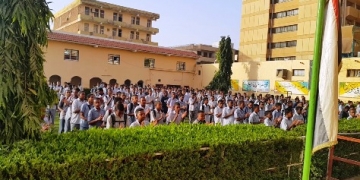
The late Sudanese Sheikh Mustafa Al-Amin is historically the unique pioneer of the (National Capitalism) movement. He started his business life from scratch until arrived to become the richest man in the history of modern Sudan and the most prominent lighthouse in the business horizon in Sudan.
Sheikh Mustafa Al-Amin did not attend formal education, but he was educated at the great school of life. He obtained the certificate of business through honesty, trustworthiness and benevolent deeds.
The book titled (Sheikh Mustafa Al-Amin from Al-Ghabsha to Hamburg) is considered one of the largest documentation of the late Al- Shiekh experience despite the scores of blogs that dealt with his rich biography. The book was prepared by the late veteran professors, Dr. Muhammad Saeed Al-Gaddal and Dr. Atef Abdul Rahman Sughairon .. The book is an important historical document on an important national figure in the Sudanese economic world.
Birth and upbringing
The country of Al-Jali’in has a glorious history among the different regions of Sudan. In one of its suburbs ,specifically Al-Mutammah, Sheikh Mustafa Al-Amin was born in the year 1889 AD.
Sheikh Mustafa Al-Amin grew up in the (Al-Balu) region, the headquarters of the Ja’aliyin tribe, in his uncle Hosh (Awad Al-Karim Abu Nekhaila), who was wounded in the Abu Telaih battle between the British troops and the Mahdi Army in Sudan on January 17, 1885AD. Abu Telaih is an stop-break for carvans crossing the Bayooda desert in Sudan on the road between Meroe and Matamma, which is 32 km north of the Nile from Matamma. The British losses in the battle convinced them to withdraw from Sudan. The incident opened the way for the victory of the Mahdist revolution. The origin of Sheikh Mustafa Al-Amin is attributed to the branch of Al-Muhammadab from the dynasty of his grandfather, Al-Ma’k Muhammad (Mak Al-Jali’in), and also he was the descendent of Al-Massalamiya clan of Al-Jali’in from the side of his grandfather Al-Mak (Bashir son of Aqeed), the last mak of the Al-Ja’alien. He lost his father when he was eight years old.
From Al-Matamma to Kordofan:
Formal education was not available in that period except in very confined areas and in certain regions. So it was natural that he resolved the question of earning his living since early youth to engage in agriculture and animal husbandry. In consequence of dispute with his uncle, he left Al-Matamma in 1908 disclaiming his father’s heirs to his mother and brothers. As thus, a penniless young man who owned nothing at the time but the aspiration of a young man to build his future through bitter struggle. Trade was the profession available to him or otherwise to be a workman. He actually joined the railway corporation for a short period, but he quitted to work as a tradesman between Abu Hamad and Halfa, then he went to Khartoum, and from there to East Kordofan: the Ghabsha\ Shurkaila\Om -Rawaba triangle.
In that region, Sheikh Mustafa Al-Amin worked in the field of rain-irrigated agriculture for a short period in the Al-Harazayah area that is located between Ghabsha and Wad Ashana (East Shorkaila region) . The railway line was passing by wad Ashana , Ghebaishah and Umm Rawaba .. As Shurkaila is located south of Umm Rawaba, the railroad does not pass through Shurkaila. Khor abu Habil separates Shurkaila from Umm Rawaba during the rainy season for several months before it dries. Just then the road becomes passable. In the town of Shurkaila he opened a small commercial store. At that time Shurkaila was famous for the production of shark plant, leather, and bee honey . Just after the rainy season came the abundant production of oilseeds; beans and sesame in particular, in addition to corn .. The triangle of Umm Rawaba\Shurkaila\Al-Ghabsha is an important region where crops were used to be brought From the neighboring villages. That region was well-known for its traditional camel – driven mills.
Sheikh Mustafa Al-Amin went to trade in crops, especially oilseeds and peanuts were specifically among the most important of these crops besides sesame, so he worked to buy beans and sell them to the owners of traditional oil mills, then he moved to own peeling mobile machines in the area ofGhabsha.
From domestic trade to export
In 1925, he made a significant shift in his trade, as he tended to take advantage of the abundant production in the region to export. So he exported corn to Egypt, where it was re-exported from there to Europe. At the time he no longer contented himself with working in Kordofan, but thought of Sudan Port; The city of Port Sudan which represents the gateway for foreign trade in Sudan. So he constructed an oil factory in that city for the purpose of exporting. He also exported sesame to Venezuela and Sudanese products to Europe. He was then one of the greatest exporters of oilseeds and their products.
Food Oil Mills
Sheikh Mustafa Al-Amin went to industry and he had more than a hundred traditional extracting mills in Shurkaila and Ghabsha. He was the first who imported the German hydraulic mills in Ghabsha and moved in 1958 AD to the English electromechanical oil mills that he erected in the city of Port Sudan, the main port of the country to facilitate export. In 1976 he brought the latest oil extraction technology in the world which utilizes Belgian organic solvents. It was a precedent in the history of Sudan. In 1980 he was the first to export pure peanuts to America. He was the first to export cotton fluff to Egyptian military factories. By that he topped the list of exporters in Sudan . By the years (1964-1974), he was the main source of food oils to Egypt .
He was exporting mazes and oil to Germany, the which greatly impacted him that he came to repeat proudly that his works extended from al-Ghabsha to Hamburg.It was Known afterwards to be his personal motto.
Integrated manufacturing
Sheikh Mustafa Al-Amin built in 1980 the largest integrated industrial and service complex in the Middle East and Africa, the (Aba Al-Muatasem) complex, in an area of78 acres in Al-Bagair town south of Khartoum. It consists of (13) integrated production units that include soaps manufacturing of all kinds, in addition to peeling machines and oil extractors. The complex also includes the manufacture of cardboard, tin and plastic. In the field of services he established a power station and built an integrated housing for foreign experts, engineers and workers as he brought in a number of foreign experts to work in the complex and train engineers and workers who contributed to national projects. By then his sons grew up, they became the right hand on whom to rely on the implementation of his plans. He relied on his faithful son, Al-Amin to conduct work on the Bagair factories which became the largest industrial group.
His Business activities in the field of Agriculture
Sheikh Mustafa Al-Amin neglected no field that he did not address. In addition to trade and industry and exports, he established in 1984 AD the largest rain-irregated agricultural project in the country second to the Jazeera project in an area of (half a million) acres, south of the Blue Nile and Gadarif, where he cultivated (corn, sesame, and sunflower), Which form the raw materials for the industry of oilseeds or for exports. He cultivated huge areas in the area ofAl-Butana, south and north of Al-Qadarif. It should be noted that as he always did, in this project he endowed a considerable part of its production for the needy, the residents of the villages and their smaller neighborhoods that are located around these projects, as food stocks for free.
Ground transportation fleet
On basis of his work in the field of export and the intensity of his productivity in the field of agriculture and industry, it was natural for him to consider setting up a transportation fleet, in order to create integration between his various projects. In fact he established that fleet, to enable him to transport his agricultural and industrial products, and to link agricultural areas to industrial areas and export ports .
His contribution to establishing banks
Sheikh Mustafa Al-Amin contributed to the establishment of several banks that included the Commercial Bank, which became the International Investment Bank, then the Sudanese French Bank, as well as the Saudi Sudanese Bank.
In the field of labor organizations:
He was the sheikh (headman) of the wholesalers, and he obtained the membership of the first chamber of commerce that consisted in its membership major foreign and Sudanese merchants in the pre-independence era.
His interest in education, health, mosques-building and charitable work
Since private education was a method initiated by the Sudanese national movement in integration with the graduate conference to constitute a means to expand the education that the colonizer narrowed its area, Sheikh Mustafa Al-Amin with a number of merchants established in 1944 AD Khartoum National School a mosque, with a mosque attached to the premises. In 1972 within the State’s policies in the field of education, the school was attached to the Ministry of Education and its name was changed to Sheikh Mustafa Al-Amin School . In I1997 AD it became a model school which admits students from all over the country, and today it is one of the superior schools in Sudan.
Likewise, Sheikh Mustafa Al-Amin established schools in his hometown, al- Matamma in honoring of his extended family. He also built schools, mosques, and health centers in Al-Matamah, Al-Ghubshah, Port Sudan, and the mountains of Angasna.
Righteous son of Sudan:
Sheikh Mustafa Al-Amin was awarded by successive governments with many medals and orders such as the Medal of Education and the Order of the Righteous Son of Sudan, and the honor dress. In 1984 AD the University of Khartoum conferred him an honorary master degree in arts for his great role in the development of education and economics.
Sheikh Mustafa Al-Amin died on 12/14/1988 . He was then at the age of one hundred years. According to his will He was buried in the most beloved sites to him in Khartoum National School (Sheikh Mustafa Al-Amin Endowment Qur’anic Secondary School) located in the Arabian Market in Khartoum center.
















El Sheikh Mustafa Ak Amin was my first Employer together with my 3 other colleagues who graduated from the Faculty of Engineering, University of Khartoum, 1978. We learned a lot from our first meeting with him. He told us a wisdom “The poorest is the one whose daily expenditure exceeds his daily income”
God rest his good soul in heaven.